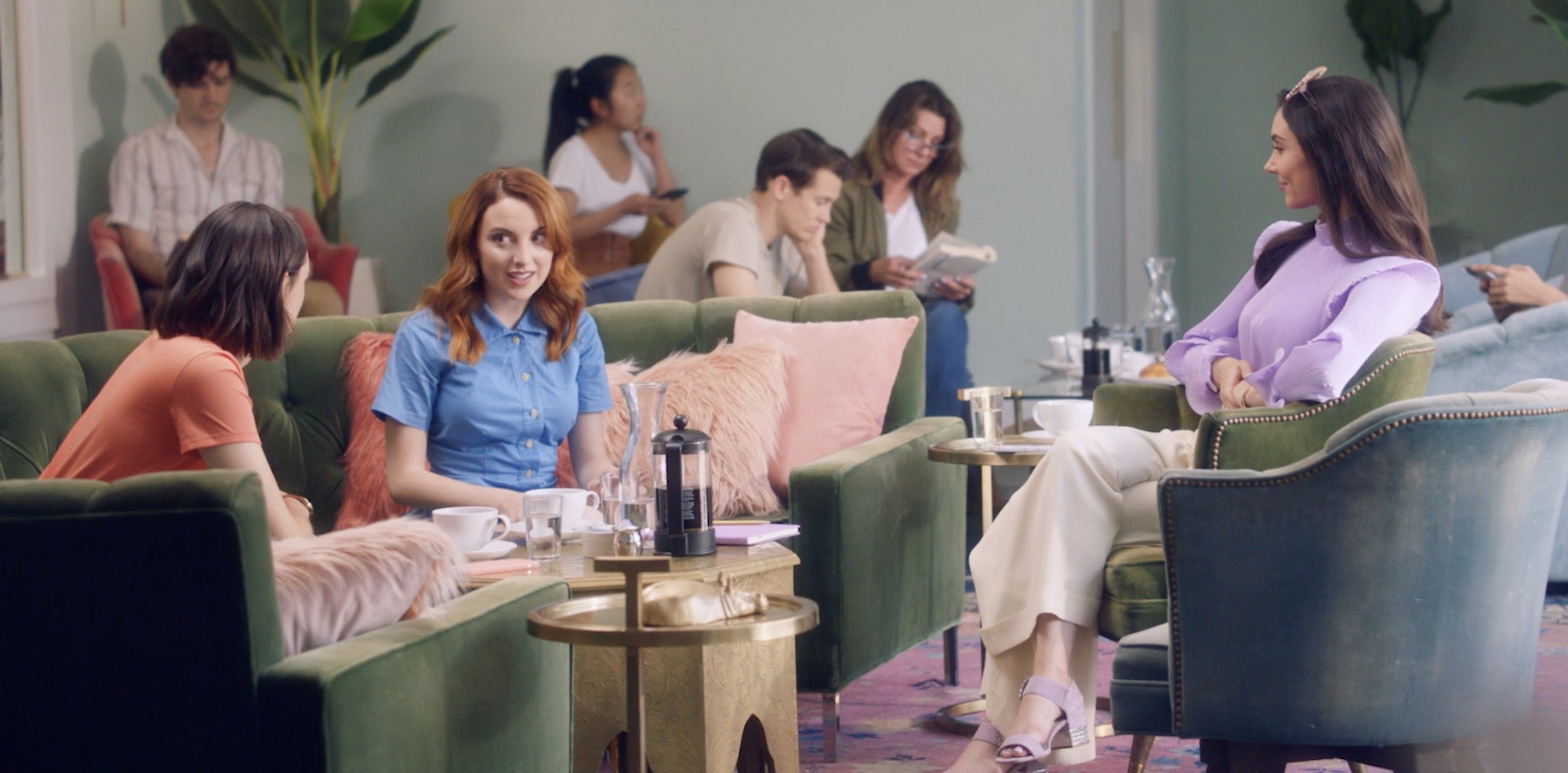
The question of representation has dominated cinematic discourse over the past few years, especially when it comes to award shows. The problem is, for every masterwork like Moonlight you’re likely to have an earnest yet tone-deaf dud like Green Book, not to mention the countless ‘important’ films at Sundance that are simply not very good. For Your Consideration wades into this thorny subject, depicting well-meaning women with privilege figuring out what it takes to create a film that will be both a hit at Sundance and win Oscars. Written by director Poppy Gordon and her co-writer Aldo Arias, the screenplay skilfully satirises those with enough self-awareness to play the game, but not enough self-awareness to understand how what they are planning actually perpetuates further stereotypes. We talked to Gordon about her experiences in the industry, how diversity initiatives can sometimes further oppression, workshopping the screenplay, and trying not to fall into the same trap that the film satirises.
Was the film inspired by anything you had seen personally within LA and the film industry?
LA and the film industry seemed like a suitable backdrop for the story, but I was inspired by everything that I was seeing around me. One of the things that shapes our culture are the stories we tell: Hollywood is definitely an important origin for such narratives.
Workshopping it with real actors helped us to understand the qualities that we were looking for.
Aldo Arias helped with this story so I can’t speak for him, but I had the original concept and pitched it to him and he further evolved it in a great way. We had a wonderful back and forth about it. I don’t know how to better say it, but there was definitely a feeling of urgency to get this film made and out there – it felt like a necessary expression, a purging of sorts. I was just taking in all the hypocrisy and irony I was subject to and the film was the result. I’m sure for Aldo it was the same.
I was seeing, on the right, on the left, in the middle, the hypocrisy of people and companies wanting to exonerate themselves of the past exclusionary culture they had been fostering by all of a sudden kind of participating in this kind of radical chic behavior but it didn’t feel genuine in a way, like Kyle Jenner in that Pepsi ad. A lot of these efforts seemed very flat and actually continuing to support systems of oppression by relying heavily on tokenism.


Your screenplay has a great way of revealing these double standards. Tell me about the writing process with Arias?
We had a great time writing it. We would read the dialogue to each other, then I would kind of improv on it and revise. The original script was brilliant and very sharp: we just refined and improved it with each other to give it a little bit more vibration. We went even further by workshopping it with actors, seeing how it would play, allowing some freeform development to occur and making further revisions based on that.
The types in the film feel just right. Tell me about the casting process?
I think workshopping it with real actors helped us to understand the qualities that we were looking for. Because we were doing SAG casting, we didn’t have the budget to put all the actors in a room together to see what the best chemistry was going to be. So I really had to know what I was looking for. We were very fortunate that we had a lot of folks that wanted to audition and that the talent pool we got to cast from in L.A. is just phenomenal. This group felt like the best of what I was looking for. And once we got on set, everybody got to meet and work together, it just clicked. I think there were lasting friendships formed on set.

The film has a technicolour aesthetic, with quite vivid costuming and colouring. Walk me through that.
I was inspired by musicals. Their history is an interesting one. When things were really not so wonderful in America, the films that people wanted to see were these really happy, beautiful musicals. I wanted to reference this in some way, in the sense that the gap between the rich and the poor is ever-widening, as well as the challenges of climate change and the global situation. I definitely had some bitter critique to offer, but I felt like in order to reach out to different audiences, I had to deliver it in a beautiful and less expected wrapper. I thought, perhaps this way I can attract a different audience and engage in a more rewarding conversation with people. I was also very much inspired by films like The Umbrellas of Cherbourg, which are very pastelly and beautiful.
It’s usually the men who run the show, but your film only features women…
I guess it was to show that this conversation is going above and beyond gender and to make a greater point in terms of income inequality, cultural caste system and nepotism we are also in denial of.

You also have one character of colour, who initially takes the stereotypical role in white satire of being rather blameless but then she also engages in clichés about Mexicans. Was it important to change this role a bit?
Exactly. That was to make a greater point just to show we’re all humans and perhaps make audiences question their own assumed stereotypes they’ve internalised for whatever reason. I wanted to get beyond tokenism and have a greater conversation about privilege.
Sure, this is a time of change, but if these changes are made through a distorted mirror — one that refuses to reflect the role that privilege plays in choosing who gets to be seen and heard — then such change may manifest itself in some very disconnected and odd ways. The Activist competition series that was cancelled before it made it to TV is a good case and point.
I wanted to get beyond tokenism and have a greater conversation about privilege.
So your film is a satire about films with a message, while also including a message itself. Was there any concern that you might fall into the same trap the film satirises?
I think the film is very much laughing at itself. I don’t think it’s saying that Aldo and I are in any way exempt. I mean, I also want to get into film festivals. I was using ‘this film’ to get into film festivals. So I was very keenly aware of that. If I wanted to write a paper, I would write a paper. I wanted to make a film. I don’t think it necessarily spells everything out for everybody and can be interpreted in different ways, ignite dialogue and bring people from different walks of life together.

What are you working on next?
I’m developing another short as well as a feature at the moment. It’s still very much in progress and under wraps so I’m not really in that position to pitch quite yet but hopefully we will get there soon.



. I loved this film for its wit. The interview reveals the thought and consideration that went into its making.
Glad you enjoyed it Allison, Poppy is definitely a filmmaker to watch.